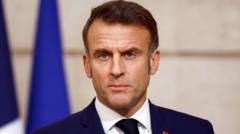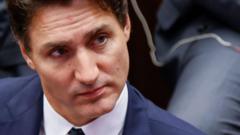Emmanuel Macron vows to appoint a new prime minister shortly after Michel Barnier's resignation post no-confidence vote, facing a political landscape characterized by division among parties and public criticism regarding his approach to governance.
Macron Announces Upcoming Prime Minister Appointment Amid Political Turmoil

Macron Announces Upcoming Prime Minister Appointment Amid Political Turmoil
French President Emmanuel Macron prepares to name a new prime minister after Michel Barnier’s resignation, navigating a fractured parliament and growing opposition.
French President Emmanuel Macron has revealed his intention to appoint a new prime minister "in the coming days," following the resignation of Michel Barnier, who was ousted after a historic no-confidence vote in parliament. Addressing the nation, Macron dismissed calls for his resignation, asserting his commitment to remain in office until the end of his term in 2027.
In the wake of Barnier's removal—only three months after his appointment—Macron expressed gratitude for Barnier's brief tenure and argued that opposition parties had conspired in an "anti-republican front" to destabilize the government. This no-confidence vote marked an unprecedented event in French politics, representing the first time in over six decades that a government had been ousted by parliament.
Currently, France's National Assembly is divided among three principal factions: the left, the center, and the far-right. Macron’s challenge lies in finding a prime minister who can garner sufficient support from parliament to ensure stability and continuity. Any candidate for the position will need backing from at least segments of the left bloc, which recently joined forces in voting against Barnier.
Macron engaged in discussions with various political leaders starting Friday, including centrist allies, Socialists, and representatives from right-wing factions. Socialist leader Olivier Faure indicated a willingness to negotiate, while simultaneously expressing reservations about perpetuating "Macronism." No new parliamentary elections can occur until July 2025, prompting Faure's openness to a potential compromise toward establishing a "fixed-term" government arrangement.
The political landscape is further complicated by the far-right National Rally, led by Marine Le Pen, which participated in the no-confidence vote against Barnier. Le Pen argued that holding the government to account, as allowed under the current constitutional framework, cannot be deemed anti-republican.
With Barnier's resignation effective immediately, he will continue to serve in a caretaker role until a new government is established. Macron acknowledged the political turmoil surrounding his decision to call snap elections, leading to the ongoing deadlock in parliament. He admitted that his rationale was not well-received, stating, "Many have blamed me for it... It's a fact and it's my responsibility."
The speculation regarding potential candidates to succeed Barnier includes Defence Minister Sébastien Lecornu and Interior Minister Bruno Retailleau, alongside centrist figures such as François Bayrou. The timeline for appointing the new government may be constrained, particularly with the Notre-Dame Cathedral’s reopening ceremony scheduled for Saturday, which will see attendance from global leaders.
As Macron aims to stabilize his administration amid mounting political challenges, he emphasized achievements such as the ongoing reconstruction of Notre-Dame and France’s role in hosting the 2024 Olympics, asserting, "We can do great things. The world admires us for that."




















